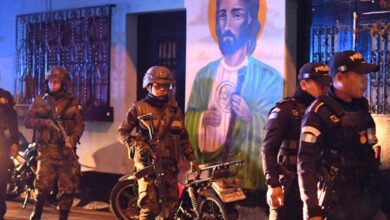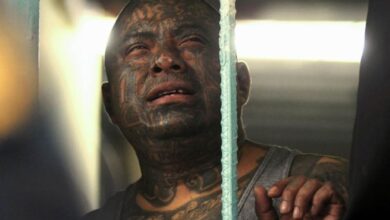The U.S. imposes visa restrictions on Guatemalan officials for undermining democracy amid political turmoil surrounding President-elect Bernardo Arévalo's contentious victory.

Aerial photo with a drone of citizens during a protest in Guatemala’s central square in front of the National Palace of Culture in Guatemala City, Guatemala. EFE/ Esteban Biba
The Latin American Post Staff
Escucha este artículo
Leer en español: Estados Unidos sanciona a figuras guatemaltecas por “acciones antidemocráticas en curso”
Global Stand Against Democratic Erosion
In boldly signaling its commitment to global democratic principles, the Biden administration announced stringent visa restrictions on nearly 300 Guatemalan politicians, business leaders, and their families. This action marks a significant response to the alleged efforts by these individuals to destabilize the democratic process and undermine the rule of law in Guatemala.
Guatemala, a nation already grappling with various internal challenges, now faces increased scrutiny from international leaders and watchdog organizations. The primary concern is the alleged obstructionist tactics against the progressive President-elect, Bernardo Arévalo. Arévalo's election victory, secured under the banner of the Seed Movement party, has been a source of contention, particularly among the long-entrenched power circles within the country. His reputation as an anti-corruption advocate has made him a prime target, evidenced by the systematic harassment of his party members, unwarranted legal raids, and persistent efforts to strip him of his immunity for direct prosecution.
The U.S. State Department's statement emphatically condemned the "ongoing anti-democratic actions" perpetrated by Guatemalan prosecutors and other influential figures. It specifically highlighted their attempts to discredit the legitimacy of Guatemala's electoral process and obstruct a peaceful transition of power. However, in a move that maintains a degree of diplomatic discretion, the State Department withheld the names of the individuals facing these new visa restrictions from the public and the press, including The Associated Press.
Targeted Individuals and Allegations of Political Persecution
The statement from the State Department elucidated that the targeted individuals were implicated in various activities aimed at politically persecuting the opposition. These activities include intimidation of peaceful protesters, unauthorized raids, tampering with ballot boxes, and the questionable removal of immunity from electoral magistrates who played a crucial role in certifying the election results.
This development follows accusations from prosecutors last week, who claimed that documents obtained during a raid on electoral offices revealed irregularities in the August presidential runoff vote, which Arévalo won. These allegations, suggesting that the election results were void, were met with staunch opposition from Arévalo. He accused the prosecution of attempting to weaken his impending governance. This sentiment found resonance with several international entities, including the Organization of American States and the European Union. Having monitored the election, both organizations attested to its adherence to democratic standards.
U.S. Response to Controversial Actions in November
The U.S.'s decision to impose visa restrictions has been catalyzed by a series of controversial actions by the Guatemalan Congress in November. One such action included targeting four electoral magistrates who fled the country. Another contentious decision involved the passing of a national budget. Critics argue that this budget impedes Arévalo's ability to fulfill his campaign promises while increasing funding for entities purportedly involved in anti-democratic practices.
Also read: Guatemala's Electoral Dispute Places Democracy on the Brink
The unfolding political drama in Guatemala, culminating in the U.S. government's recent sanctions, underscores the fragile state of democracy in the region. It also highlights the complex interplay between domestic politics and international diplomacy. As President-elect Bernardo Arévalo prepares to take office amidst these tumultuous circumstances, the eyes of the world remain fixed on Guatemala, awaiting the next chapter in its ongoing struggle for democratic integrity and stability.




